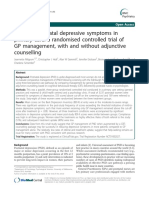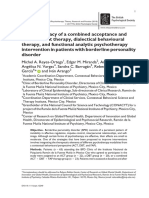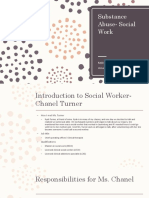Alzh 1 ART Intervenciones Psicosocial y Conductual en Demencia-Burns
Alzh 1 ART Intervenciones Psicosocial y Conductual en Demencia-Burns
Uploaded by
Kitzia AveiriCopyright:
Available Formats
Alzh 1 ART Intervenciones Psicosocial y Conductual en Demencia-Burns
Alzh 1 ART Intervenciones Psicosocial y Conductual en Demencia-Burns
Uploaded by
Kitzia AveiriOriginal Description:
Copyright
Available Formats
Share this document
Did you find this document useful?
Is this content inappropriate?
Copyright:
Available Formats
Alzh 1 ART Intervenciones Psicosocial y Conductual en Demencia-Burns
Alzh 1 ART Intervenciones Psicosocial y Conductual en Demencia-Burns
Uploaded by
Kitzia AveiriCopyright:
Available Formats
Psychosocial and behavioural interventions in dementia
Alistair Burns
Purpose of review
The purpose of this review is to describe studies concentrating
on psychosocial and behavioural interventions for patients with
dementia, particularly those published between spring 2003
and spring 2004 and specifically excluding those primarily
involving medication. They consist of a variety of
nonpharmacological approaches such as interventions for
carers and behavioural approaches to the management of
symptoms of dementia. In addition, the broader context of the
importance of these interventions will be considered.
Recent findings
Most studies confirm previous observations regarding the
negative effects of caregiving on the physical and mental health
of carers. Recent findings have also shown that effective
interventions for caregivers should be targeted to individual
needs and can effectively involve patients themselves in the
process. Specific carer interventions to reduce depression and
anxiety are of benefit and the effects last longer than just the
duration of the intervention. Generally, the quality of research on
interventions is improving.
Summary
There are now a myriad of opportunities to intervene using
nonpharmacological approaches, to manage a number of
symptoms of dementia and to alleviate the stress on carers.
Combining pharmacological and nonpharmacological
interventions seems an appropriate aspiration for anyone
involved in the care of people with dementia.
Keywords
dementia, caregivers, interventions, behaviour, psychosocial
Curr Opin Psychiatry 17:433437.
2004 Lippincott Williams & Wilkins.
University of Manchester, Education and Research Centre, Wythenshawe Hospital,
Manchester, UK
Correspondence to Alistair Burns MD FRCP FRCPsych, Professor of Old Age
Psychiatry, University of Manchester, 2nd Floor, Education and Research Centre,
Wythenshawe Hospital, Manchester M23 9PL, UK
Tel: +44 161 291 5885/6/7; fax: +44 161 291 5882;
e-mail: A_Burns@fs1.with.man.ac.uk
Current Opinion in Psychiatry 2004, 17:433437
# 2004 Lippincott Williams & Wilkins
0951-7367
Introduction
The negative impact of dementia is immense both in
terms of personal suffering and economic consequences.
Monetary costs are enormous, estimated at 6 billion in
the UK alone [1], with the estimated economic value of
informal carers being estimated at US$196 billion [2].
The suffering of individuals who have the disease and
the ramications in terms of stress on caregivers, their
quality of life [3] and their physical, mental and general
health [4,5] deserve particular attention.
Reviews of outcomes of interventions aimed at reducing
stress in caregivers [6,7] emphasize the signicant
negative emotional impact of caring for a person with
dementia, while the physical and physiological outcomes of caring have been less well researched [4]. It is
the long neglected psychiatric symptoms and behavioural disturbances that are a core part of the dementia
syndrome which merit particular mention as important
features of dementia leading to stress and strain in
carers [8]. Aside from the usual pharmacological
interventions to alleviate these symptoms, a number
of nonpharmacological interventions have also been
used with success [9,10].
Any discussion focusing on nonpharmacological treatments of people with dementia should take into account
cross-cultural issues concerning the expression and
management of symptoms [11]. Furthermore, descriptions of novel services whose aspirations are to manage
patients effectively should be included, as well as an
analysis of where these symptoms may best be detected,
evaluated and managed in primary care.
Caregiver interventions
There have been a number of ways in which research
has highlighted interventions that help to reduce stress
and strain in caregivers of patients with dementia
[12,13]. Examples are education and training, programmes, support groups and counselling [14 . .]. The
success outcomes of these interventions have been
measured in terms of reducing caregiver symptoms
(distress, depression, psychological symptoms), improving the mental health of patients themselves and
delaying admission to nursing or residential homes.
Brodaty and colleagues [14 . .] carried out a metaanalysis of psychosocial interventions for caregivers of
people with dementia: they searched standard electronic databases (in English) and located 34 studies
between 1985 and 2001 (describing 30 interventions)
which could be rated on a number of criteria for
433
434 Geriatric psychiatry
quality. These quality criteria included the design of
the study, a description of the patients, the nature of
the outcome variables, the appropriateness of the
statistics and the way in which the results were rated.
Interventions on informal caregivers outside institutional care were examined. The main ndings of the
review were that, in general, the quality of research
has improved over the 17 years of the assessment, with
signicant benets seen for caregivers in terms of
reduced psychological distress, improved knowledge, a
global outcome measure and improvement in patients
mood. However, there was no positive impact for
caregiver burden. It was noted that there was
considerable variability in outcome, explained, at least
in part, by differences in methodology and the type of
intervention used. Generally, however, interventions
were more likely to be successful if patients were
themselves involved. Of the seven studies which
examined admission to nursing homes, four showed
an improvement. Bespoke interventions were shown to
be much more likely to be successful and these should
be the target of future research strategies a view
supported by another systematic review [15 .]. The
increased sophistication of interventions and the need
to target at risk groups and to improve the methodology were discussed, with suggestions of a more radical
change in design and an urgent need to prioritize
theoretically driven interventions [16]. The failure of
caregiver interventions results in mixed messages being
given out about the effectiveness, or otherwise, of such
an approach [16].
Some studies have concentrated on more specic
symptoms as targets for interventions [17,18] and have
developed methods to ameliorate these, such as
focusing on female carers and targeting symptoms such
as anger and depression. Coon et al. [19 . .] examined the
short-term impact of two theoretically based psychoeducational small group interventions. The participants
were 169 women aged over 50 who were caring for a
relative with dementia living in the community.
Participants were assigned to a control group, depression management or anger management; interventions
took place over a 1216 week period with the primary
outcomes being anger or hostile mood, depressed mood,
the frequency of the use of coping strategies and the
persons own perception of the efcacy of caregiving.
The intervention was highly successful in reducing
symptoms, increasing the use of positive cognitive
coping strategies and increasing the persons own view
of their effectiveness. The study supports the body of
evidence recommending the role of skills training in
small groups to improve both psychological well-being
and coping strategies in caregivers. Symptoms such as
depression have commonly been assessed but this is
now broadening out to aspects of phenomenology,
which have received less attention. For example, it is
well known that having a condante protects against
depression and this may be measured by a perceived
sense of loneliness, a symptom that one might argue
could relatively easily be resolved by simple social
strategies. Loneliness has been shown to be more
prevalent amongst the caregivers of people with
dementia in one study [20 .] it was found to be the
strongest predictive factor for the presence of depression amongst caregivers. The importance of support
from others is underscored by the observation that
references to friends were made spontaneously by onethird of carers in an analysis of open-ended interviews
[21].
The exact nature of a successful intervention was
analysed by Burns et al. [22]. Patients were randomized
to receive advice on patient behaviour management with
or without a caregiver stress coping package. The study
extended follow-up to 2 years and involved 167
participants. The additional coping advice was more
successful in reducing depression and increasing general
well-being amongst caregivers.
A novel approach adopted by Maas et al. [23] was to
involve family carers in the care of people with dementia
in special care units. Family involvement was regarded
positively by care unit staff and helped to normalize
perceptions by both groups (more so in the family
caregivers than the specialist staff), although it did not
seem to impact on perceived conict with staff by
caregivers.
Most clinicians would accept the signicant crossover
between anxiety and depression and there is good
evidence that a cognitive behavioural intervention
specically reducing anxiety is also effective. Akkerman
and Ostvald [24 . .] used cognitive behaviour therapy in
38 caregivers who were anxious and who were randomly
assigned to a 9-week intervention or a waiting list
control. The intervention group demonstrated less
anxiety on a self-report and clinician administered
measure immediately following treatment and, interestingly, the results were maintained for a further 6 weeks.
Not only did the intervention improve symptoms of
anxiety but also ability to sleep. Whether the intervention is a formal cognitive behavioural therapy approach
or a generally supportive technique, the sustainability of
the intervention has been shown for up to 3 years [25 . .]
and this seems to be independent of caregiver gender,
severity of dementia and, intriguingly, remains signicant after the sufferer has been admitted to a nursing
home.
Caregiver appraisals (as measured by expressed emotion
or attributional style) can have an important impact [26].
Psychosocial and behavioural interventions Burns 435
As most ratings of behaviours are through caregiver
reports rather than direct observation, the effect of a
caregivers appraisal style, perhaps modied by an
intervention, can inuence the rate of reported behaviours. While interventions may not reduce the frequency of patient behaviour interventions, it can reduce
the reaction of caregivers to these interventions [27].
Interventions with patients
A number of nonpharmacological treatments have been
developed to alleviate behavioural disturbances in
dementia. Exercise plus behavioural management was
used [28 . .] in 153 patients with Alzheimers disease who
were randomized to receive the combined exercise and
caregiver training programme (reducing disability in
Alzheimers disease) or to receive routine care. The
intervention was effective at getting the group to
exercise and resulted in a positive improvement with
fewer days of restricted activity. Symptoms of depression
also improved with exercise, which were sustained at 2
years and were associated with a reduction in institutionalization. Higher baseline scores of depression were
associated with better outcome. It is unclear which
particular components of the intervention were effective,
that is the physical exertion, the behavioural component
or an amalgamation of the two. Trials which use such a
well characterized methodology are a major advance in
terms of research methodology and may lead to a
signicant change in the clinical management of
behavioural problems in patients with dementia. Exercise therapy can also result in increased muscle
strength (both in the quadriceps muscle and in handgrip
strength) and improved walking may help reverse the
neuromuscular weakness which often accompanies
dementia [29 .]. Drama therapy can also be helpful [30]
and sleep hygiene measures are of proven benet in
keeping patients asleep [31 .].
When interventions involve both a patient and a
caregiver, assessments are usually made of each to
achieve a complete picture of the situation. Measures
such as ratings of quality of life can differ between
patients and carers to such an extent that caution should
be exercised in their interpretation, particularly when
caregiver burden is high [32 .].
Cross-cultural and gender issues
It is well documented that there is a gender effect on
interventions, with some studies [19 . .] concentrating on
female caregivers. Male spousal caregivers had signicantly lower levels of stress, depression and caregiver
burden, anxiety, hostility and somatic symptoms and
higher natural killer cell numbers (a subset of lymphocytes) compared with women, but there were no
differences in coping resources or other immunological
cell activity [33]. Clearly, caregiver gender continues to
be a very important aspect of dening interventions.
The response to caregiver interventions varies for
spouses and other relatives [33].
The experience of dementia can vary depending on the
background and experience of an individual and
services need to be developed that are equally available
to all cultures. Burgio et al. [34 . .] examined a novel
service in which caregivers of patients with dementia
from either a white or African American background
were randomly allocated to receive a specic skills
training programme or minimal support. Those caregivers who were white showed more improvement in
the minimal support condition while African American
caregivers improved more with the skills training. The
barriers to implementation of intervention research for
Latino caregivers have been specically addressed and
lessons learnt. These include the need for clinical
researchers to be sensitive to cultural values and
language preference, and to forge effective links with
local Latino communities to implement successful
research programmes [35 .].
Services
Many publications describe innovative services for
people with dementia. Access to services is an important
public health measure to reduce suffering and burden for
caregivers of people with dementia. Descriptions of
outreach programmes exist which target particular groups
such as Latino caregivers in Los Angeles [36 .] and
Malaysia [37 .]. The conclusions of the study of
Malaysian caregivers emphasized the importance of
ethnicity and cultural differences which should be
considered before any caregiver intervention is implemented, including cultural perceptions of dementia and
dementia care, and the need to have qualitative studies
to enable additional insights to be made into specic
coping strategies. Latino caregivers were found to
receive fewer services than expected and patients had
less access to services including a medical workup. Over
half used no formal services, although over 90% of
patients were under the care of a physician who, in
Latino culture, is a recognized and powerful gure of
authority, often consulted on issues of mood and
behaviour and therefore highly likely to be aware of
problems and to provide a focal point for interventions.
The issues of intervention in primary care have also
been highlighted [38].
Concentrating on early stages of dementia is an
appropriate strategy, but most interventions target
people in the later stages of the disease. Peer support
is a powerful intervention, encouraging caregivers to
share experiences and frustrations, and to discuss the
issue of loneliness and the positive effect of friendship.
The majority of carers nd such support helpful [39 .].
436 Geriatric psychiatry
Conclusion
19 Coon DW, Thompson L, Steffen A, et al. Anger and depression management: psychoeducational skill training interventions for women caregivers of a
relative with dementia. Gerontologist 2003; 43:678689.
Shows that management of anger and depression can be effective in helping
female caregivers. An important contribution to defining what specific interventions
are helpful.
..
There is ample emerging evidence supporting the
benets of psychosocial and behavioural interventions
in dementia. Trials testing specic effects have grown in
sophistication in terms of interventions used, the
symptoms targeted and the methodology of the trials.
Descriptions of services add signicantly to the body of
knowledge on how interventions can be translated into
clinical practice.
References and recommended reading
22 Burns R, Nichols LO, Martindale-Adams J, et al. Primary care interventions
for dementia caregivers: 2-year outcomes from the REACH study.
Gerontologist 2003; 43:547555.
Papers of particular interest, published within the annual period of review, have
been highlighted as:
.
of special interest
..
of outstanding interest
1
Bosanquet N, et al. Alzheimers disease in the UK. Imperial College, London;
1998.
Arno PS, Levine C, Memmott MM. The economic value of informal
caregiving. Health AFf (Millwood) 1999; 18:182188.
Jones D, Peters T. Caring for elderly dependents: effect on carers quality of
life. Age Ageing 1992; 21:421428.
Patterson T, Grant I. Interventions for caregiving in dementia: physical
outcomes. Curr Opin Psychiatry 2003; 16:629633.
Haley WE, Levine EG, Brown SL, et al. Psychological, social and health
consequences of caring for a relative with senile dementia. J Am Geriatr Soc
1987; 35:405411.
Pusey H, Richards D. A systematic review of the effectiveness of
psychosocial interventions for carers of people with dementia. Ageing Ment
Health 2001; 5:117119.
Sorensen S, Pinquart N, Duberstein P. How effective are interventions with
caregivers? Gerontologist 2002; 42:356372.
Donaldson C, Tarrier N, Burns A. The impact of the symptoms of dementia
on caregivers. Br J Psychiatry 1997; 170:6268.
Proctor R, Burns A, Stratton Powell H, et al. Behavioural management in
nursing and residential homes: a randomised controlled trial. Lancet 1999;
354:2629.
10 Furniss L, Burns A, Cook J, et al. Effects of a pharmacists medication review
in nursing homes. Br J Psychiatry 2000; 176:563567.
11 Rait G, Chew C, Burns A. Age, ethnicity and mental illness: a triple whammy.
BMJ 1996; 313:13471348.
12 Brodaty H, Gresham M. The effects of a training programme to reduce stress
in carers of patients with dementia. BMJ 1989; 299:13751379.
13 Mittelman MS, Ferris SH, Shulman E, et al. A family intervention to delay
nursing home placement of patients with Alzheimers disease: a randomised
controlled design. JAMA 1996; 276:17251731.
14 Brodaty H, Green A, Koschera A. A meta analysis of carer interventions. J
Am Geriatr Soc 2003; 51:657664.
A summary of the literature on interventions from 1985, showing the
characteristics of interventions which are successful and demonstrating the
improvements in methodology which have occurred over the years.
..
15 Peacock SC, Forbes DA. Interventions for caregivers of persons with
dementia: a systematic review [in French]. CJNR 2003; 35:88107.
A similar summary to Ref. [14 . .] drawing broadly the same conclusions in terms of
carer interventions.
16 Carradice A, Beail N, Shankland MC. Interventions with family caregivers for
people with dementia: efficacy problems and potential solution. J Psychiatr
Ment Health Nurs 2003; 10:307315.
17 Teri L, Logsdon RG, Uomoto J, McCurry SM. Behavioural treatment of
depression in dementia patients: a controlled clinical trial. J Gerontol B
Psychol Sci Soc Sci 1997; 52B:P159P166.
18 Teri L, Logsdon RG, Pesking E, et al. Treatment of agitation in Alzheimers
disease: a randomized placebo-controlled clinical trial. Neurology 2000;
55:12711278.
20 Beeson R. Loneliness and depression in spousal caregivers of those with
Alzheimers disease versus non-caregiving spouses. Arch Psychiatr Nurs
2003; XVIII:135143.
Raises the profile of loneliness as a determinant of stress in carers, suggesting that
simple social support can be very effective.
21 Lilly ML, Richards BS, Buckwalter KC. Friends and social support in
dementia caregiving. Assessment and intervention. J Gerontol Nurs 2003;
29:2936.
23 Maas ML, Reed D, Park M, et al. Outcomes of family involvement in care
interventions for caregivers of individuals with dementia. Nurs Res 2004;
53:7686.
24 Akkerman RL, Ostwald SK. Reducing anxiety in Alzheimers disease family
caregivers: the effectiveness of a nine-week cognitive-behavioral intervention.
Am J Alzheimer Dis Other Dementias 2004; 19:117123.
This study showed that a 9-week intervention improved not just anxiety but also
sleep in carers of patients with Alzheimers disease. Also, an important
contribution to defining what specific interventions are helpful.
..
25 Mittelman MS, Roth DL, Coon DW, Haley WE. Sustained benefit of
supportive intervention for depressive symptoms in caregivers of patients with
Alzheimers disease. Am J Psychiatry 2004; 161:850856.
An important study showing that the benefit of interventions can last for up to 3
years.
..
26 Tarrier N, Ward J, Burns A, et al. Expressed emotion and attributes in the
carers of patients with Alzheimers disease: the effect on carer burden. J
Abnorm Psychol 2002; 111:340349.
27 Mittelman MS, Roth DL, Haley WE, Zarit SH. Effects of a caregiver
intervention on negative caregiver appraisals of behavior problems in patients
with Alzheimers disease: results of a randomized trial. J Gerontol B Psychol
Sci Soc Sci 2004; 59B:2734.
28 Teri L, Gibbons LE, McCurry SM, et al. Exercise plus behavioral management in patients with Alzheimers disease. JAMA 2003; 290:20152022.
A multi-factorial intervention including exercise which improved well-being and
symptoms of depression, leading to a reduction in disability.
..
29 Thomas VS, Hageman PA. Can neuromuscular strength and function in
people with dementia be rehabilitated using resistance-exercise training?
Results from a preliminary intervention study. J Gerontol A Biol Sci Med Sci
2003; 58A:746751.
Neuromuscular strength and gait can be improved with exercise.
30 Lepp M, Ringsberg KC, Holm A-K, Sellersjo G. Dementia involving patients
and their caregivers in a drama programme: the caregivers experience. J Clin
Nurs 2003; 12:873881.
31 McCurry SM, Gibbons LE, Logsdon RG, et al. Training caregivers to change
the sleep hygiene practices of patients with dementia: the NITE-AD project. J
Am Geriatr Soc 2003; 51:14551460.
Sleep disturbance, a potent causative factor in stress, can be improved with a
training programme.
32 Sands LP, Ferreira P, Stewart AL, et al. What explains differences between
dementia patients and their caregivers ratings of patients quality of life? Am
J Geriatr Psychiatry 2004; 12:272280.
Evaluates the different perceptions of quality of life between patients and their
caregivers.
33 Thompson RL, Lewis SL, Murphy MR, et al. Are there sex differences in
emotional and biological responses in spousal caregivers of patients with
Alzheimers disease? Biol Res Nurs 2004; 5:319330.
34 Burgio L, Stevens A, Guy D, et al. Impact of two psychosocial interventions
on white and African American family caregivers of individuals with dementia.
Gerontologist 2004; 43:568579.
A unique study evaluating the different effects of carers intervention in two ethnic
groups. Provides important insights into transcultural research in this area.
..
35 Gallacher-Thompson D, Solano N, Coon D, Arean P. Recruitment and
retention of Latino dementia family caregivers in intervention research: issues
to face, lessons to learn. Gerontologist 2003; 43:4551.
A novel description of how to approach people from ethnic groups with a view to
involving them in research projects.
Psychosocial and behavioural interventions Burns 437
36 Aranda MP, Villa VM, Trejo L, et al. El Portal latino Alzheimers project: model
program for Latino caregivers of Alzheimers disease-affected people. Social
Work 2003; 48:259271.
A description of a project which proves that involvement of caregivers from
cultures not normally fully engaged with services can be successful.
37 Choo W-Y, Low W-Y, Karina R, et al. Social support and burden among
caregivers of patients with dementia in Malaysia. Asia Pac J Public Health
2003; 15:2329.
Emphasizes the unique aspects of caring for patients with dementia in Asia.
38 Woods RT, Moniz-Cook E, Iliffe S, et al. Dementia: issues in early recognition
and intervention in primary care. J R Soc Med 2003; 96:320324.
39 Zarit SH, Femia EE, Watson J, et al. Memory Club: a group intervention for
people with early-stage dementia and their care partners. Gerontologist
2004; 44:262269.
A description of a service specifically for people with early dementia.
You might also like
- Stress Management in Medical Education A Review.23Document12 pagesStress Management in Medical Education A Review.23Kaycee100% (1)
- Texas Medication Algorithm ProjectDocument66 pagesTexas Medication Algorithm ProjectAdrian SigalNo ratings yet
- Self Hypnosis Course, Lesson 1-7 T.wattSDocument16 pagesSelf Hypnosis Course, Lesson 1-7 T.wattSNiky Giaccio100% (3)
- 2011 Detection of Depression and Anxiety Disorders in Primary Care Friendly)Document9 pages2011 Detection of Depression and Anxiety Disorders in Primary Care Friendly)rocksurNo ratings yet
- Inggris IntervensionDocument8 pagesInggris IntervensionNasrudin JamilNo ratings yet
- Harris Et Al., 2013 (BA - Depression - Physical Illness)Document6 pagesHarris Et Al., 2013 (BA - Depression - Physical Illness)Alba EneaNo ratings yet
- Running Head: Effectiveness of Dementia Inteventions 1Document17 pagesRunning Head: Effectiveness of Dementia Inteventions 1John Mureithi NjugunaNo ratings yet
- Reducing Work Related Psychological Ill Health and Sickness AbsenceDocument15 pagesReducing Work Related Psychological Ill Health and Sickness AbsenceBM2062119PDPP Pang Kuok WeiNo ratings yet
- Facilitated Pa-Depression-2Document13 pagesFacilitated Pa-Depression-2api-332791374No ratings yet
- Interpersonal PsychotherapyDocument9 pagesInterpersonal PsychotherapybizeliveNo ratings yet
- Tugas Bipolar JournalDocument14 pagesTugas Bipolar JournaliatmuliyanaNo ratings yet
- Behavioral and Psychological Disturbances in Alzheimer Disease: Assessment and TreatmentDocument11 pagesBehavioral and Psychological Disturbances in Alzheimer Disease: Assessment and Treatmenttiara perdana pNo ratings yet
- Effectiveness of Cognitive Behavioural Therapy in Primary Health Care- A ReviewDocument16 pagesEffectiveness of Cognitive Behavioural Therapy in Primary Health Care- A ReviewcoolnaluNo ratings yet
- Mindfulness SRDocument22 pagesMindfulness SRlea.clairetersouNo ratings yet
- Stepped Care Treatment Delivery For Depression: A Systematic Review and Meta-AnalysisDocument17 pagesStepped Care Treatment Delivery For Depression: A Systematic Review and Meta-AnalysisEtika Tunjung KencanaNo ratings yet
- Running Head: Effectiveness of Dementia Inteventions 1Document12 pagesRunning Head: Effectiveness of Dementia Inteventions 1John Mureithi Njuguna100% (1)
- Milgr PDFDocument9 pagesMilgr PDFCristina Maria BostanNo ratings yet
- Implementing Evidence-Based Practices in Routine Mental Health Service SettingsDocument4 pagesImplementing Evidence-Based Practices in Routine Mental Health Service SettingsmuhammadturmuzinurNo ratings yet
- 2016 YouthsubstusebriefDocument4 pages2016 YouthsubstusebriefMagdalenaNo ratings yet
- Reyes-Ortega 2019 ACT or DBT or Both - With Borderline Personality DisorderDocument16 pagesReyes-Ortega 2019 ACT or DBT or Both - With Borderline Personality DisorderMario Lopez PadillaNo ratings yet
- Reducing Stress and Burnout in Junior Doctors: The Impact of Debriefing SessionsDocument22 pagesReducing Stress and Burnout in Junior Doctors: The Impact of Debriefing SessionsMinodora MilenaNo ratings yet
- Article JournalDocument5 pagesArticle JournalAmrit SapkotaNo ratings yet
- Drug and Alcohol Review - 2009 - RITTER - The Influence of The Therapeutic Relationship in Treatment For Alcohol DependencyDocument8 pagesDrug and Alcohol Review - 2009 - RITTER - The Influence of The Therapeutic Relationship in Treatment For Alcohol DependencymarianaNo ratings yet
- A Literature Review of The Evidence For The Effectiveness of Experiential PsychotherapiesDocument30 pagesA Literature Review of The Evidence For The Effectiveness of Experiential PsychotherapiesaldiNo ratings yet
- PsychologyDocument4 pagesPsychologyJonathan AustinNo ratings yet
- Eating Disorders and Psychoeducation - Patients' Experiences of Healing ProcessesDocument7 pagesEating Disorders and Psychoeducation - Patients' Experiences of Healing ProcessesMa José EstébanezNo ratings yet
- PDF Michalak Et Al 2019 Mindfulness in Individual TherapyDocument13 pagesPDF Michalak Et Al 2019 Mindfulness in Individual Therapyluis.callegarioNo ratings yet
- Literature Review of Palliative CareDocument8 pagesLiterature Review of Palliative CareHendy LesmanaNo ratings yet
- Schueller, Stephen - Disseminating Self Help Positive Psycology Exercises in An Oline TrialDocument10 pagesSchueller, Stephen - Disseminating Self Help Positive Psycology Exercises in An Oline TrialAntonioNo ratings yet
- Cognitive Behavioral Therapy For Psychotic SymptomsDocument149 pagesCognitive Behavioral Therapy For Psychotic SymptomsCrina SerbanNo ratings yet
- SocialDocument3 pagesSocialIsmioktaNo ratings yet
- Research 1: PDFDocument3 pagesResearch 1: PDFYogitha JainNo ratings yet
- Goldberg 2013Document7 pagesGoldberg 2013amin peyvandNo ratings yet
- Steve2012 Article InformingTheDevelopmentOfServiDocument17 pagesSteve2012 Article InformingTheDevelopmentOfServiNiLa AgustinaNo ratings yet
- RRL Chapter 3Document4 pagesRRL Chapter 3Blescel AntongNo ratings yet
- PCCM - Patient-Centered Clinical MethodDocument3 pagesPCCM - Patient-Centered Clinical MethodChidi Mbatuegwu100% (1)
- Dindo2017 - Article - AcceptanceAndCommitmentTherapyDocument8 pagesDindo2017 - Article - AcceptanceAndCommitmentTherapyoikksNo ratings yet
- The Effect of Motivational Interviewing On Medication Adherence and Hospitalization Rates in Nonadherent Patients With Multi-Episode SchizophreniaDocument10 pagesThe Effect of Motivational Interviewing On Medication Adherence and Hospitalization Rates in Nonadherent Patients With Multi-Episode SchizophreniaCarmen IoanaNo ratings yet
- The Effectiveness of Narrative Enhancement and and Cognitive Therapy: A Randomized Controlled Study of A Self-Stigma InterventionDocument9 pagesThe Effectiveness of Narrative Enhancement and and Cognitive Therapy: A Randomized Controlled Study of A Self-Stigma InterventionClaudio Gruber MannNo ratings yet
- Cognitive Behavioural Treatment For MildDocument14 pagesCognitive Behavioural Treatment For MildCarolina de Oliveira AlvesNo ratings yet
- Behavioral Therapies For Drug AbuseDocument15 pagesBehavioral Therapies For Drug AbuseAnkur BhatiaNo ratings yet
- Good Communication SkillsDocument5 pagesGood Communication SkillsBeryl MarshallNo ratings yet
- ContentServer PDFDocument15 pagesContentServer PDFMaginta Resy DianaNo ratings yet
- Supportive Psychotherapy in DementiaDocument8 pagesSupportive Psychotherapy in DementiaDelia ChiuzbaianNo ratings yet
- Brief Therapy in College Counseling and Mental Health - EBSCOhostDocument8 pagesBrief Therapy in College Counseling and Mental Health - EBSCOhostjanettst2No ratings yet
- IMRADDocument6 pagesIMRADchandhomepcNo ratings yet
- Specialization in clinical psychologyDocument103 pagesSpecialization in clinical psychologyswathypadmagirisanNo ratings yet
- BMC Psychiatry: Implementation of Outpatient Schema Therapy For Borderline Personality Disorder: Study DesignDocument10 pagesBMC Psychiatry: Implementation of Outpatient Schema Therapy For Borderline Personality Disorder: Study DesigncarlofonoNo ratings yet
- Psychosocial Interventions DraftDocument12 pagesPsychosocial Interventions DraftDwane PaulsonNo ratings yet
- chapter 2Document8 pageschapter 2kshitijsharma1099No ratings yet
- Benefits and Drawbacks of Medical Model of Mental IllnessDocument19 pagesBenefits and Drawbacks of Medical Model of Mental IllnessNazish JavedNo ratings yet
- Chapter 3 - Psychotherapies, alone and in combinationDocument20 pagesChapter 3 - Psychotherapies, alone and in combinationcristobal rodriguez garfiaNo ratings yet
- klingberg2010Document11 pagesklingberg2010adithyaram630No ratings yet
- 1471-244X-12-87Document12 pages1471-244X-12-87akanshtyagi70No ratings yet
- Protocol_for_a_proof_of_concepDocument12 pagesProtocol_for_a_proof_of_concepAsima MishraNo ratings yet
- Effect of Mindfulness DepressionDocument15 pagesEffect of Mindfulness DepressionMoyooree BiswasNo ratings yet
- The Psychiatric Nurse's Toolbox :Evidence-Based Interventions for Common Clinical ChallengesFrom EverandThe Psychiatric Nurse's Toolbox :Evidence-Based Interventions for Common Clinical ChallengesNo ratings yet
- Multimodal Treatment of Acute Psychiatric Illness: A Guide for Hospital DiversionFrom EverandMultimodal Treatment of Acute Psychiatric Illness: A Guide for Hospital DiversionNo ratings yet
- Motivational Interviewing Across Health Disciplines: A Comprehensive Step-by-Step Guide with Case StudiesFrom EverandMotivational Interviewing Across Health Disciplines: A Comprehensive Step-by-Step Guide with Case StudiesNo ratings yet
- The Psychiatric Cheat Sheet:Quick-Reference Guides for Mental Health Nursing and Psychopharmacology SuccessFrom EverandThe Psychiatric Cheat Sheet:Quick-Reference Guides for Mental Health Nursing and Psychopharmacology SuccessNo ratings yet
- Combining CBT and Medication: An Evidence-Based ApproachFrom EverandCombining CBT and Medication: An Evidence-Based ApproachRating: 3 out of 5 stars3/5 (1)
- Aphasia From The Inside 2017Document7 pagesAphasia From The Inside 2017Kitzia AveiriNo ratings yet
- Association of Parent Child Relationships and Executive Functioning 2015Document11 pagesAssociation of Parent Child Relationships and Executive Functioning 2015Kitzia AveiriNo ratings yet
- Applicability of Dual Route Reading Models To Spanish 2016Document5 pagesApplicability of Dual Route Reading Models To Spanish 2016Kitzia AveiriNo ratings yet
- Depresión-Alteraciones Subcorticales-Schmaal 2015Document7 pagesDepresión-Alteraciones Subcorticales-Schmaal 2015Kitzia AveiriNo ratings yet
- Desarrollo Auto, Social y MoralDocument14 pagesDesarrollo Auto, Social y MoralKitzia AveiriNo ratings yet
- Gardner 2008. Five Minds For The Future.Document18 pagesGardner 2008. Five Minds For The Future.Kitzia AveiriNo ratings yet
- Gardner 2013 FAQDocument24 pagesGardner 2013 FAQKitzia AveiriNo ratings yet
- Crítica A Gardner-WillinghamDocument15 pagesCrítica A Gardner-WillinghamKitzia AveiriNo ratings yet
- NeuroplasticityDocument1 pageNeuroplasticityAlfonso Legaspi ViñegasNo ratings yet
- Short Film OverviewDocument2 pagesShort Film OverviewAnonymous bvSFeP98mNo ratings yet
- Functional Pathology: Should Be Applied With The Knee First in 30 Degrees of Flexion and Then in Full ExtensionDocument6 pagesFunctional Pathology: Should Be Applied With The Knee First in 30 Degrees of Flexion and Then in Full ExtensionFitaNo ratings yet
- Client InformationDocument2 pagesClient InformationJonathanAllenLMTNo ratings yet
- Efficacy of Continuation ECT and Antidepressant Drugs Compared To Long-Term Antidepressants AloneDocument6 pagesEfficacy of Continuation ECT and Antidepressant Drugs Compared To Long-Term Antidepressants AloneNoelia SakiNo ratings yet
- Cirrosis Biliar Primaria Fisiopatología Presentación Clínica y La TerapiaDocument17 pagesCirrosis Biliar Primaria Fisiopatología Presentación Clínica y La TerapiaJoe Felipe Vera OchoaNo ratings yet
- LoperamideDocument5 pagesLoperamideErick TriardiantoNo ratings yet
- B Pharm 7 Sem Pharmacognosyand Phytochemistry 5 (Phytopharmaceutical Harbal Technology) p5 Winter 2016 PDFDocument2 pagesB Pharm 7 Sem Pharmacognosyand Phytochemistry 5 (Phytopharmaceutical Harbal Technology) p5 Winter 2016 PDFRushikesh BorkarNo ratings yet
- psy405 final term mcqs file-1Document22 pagespsy405 final term mcqs file-1noorsarfraz83No ratings yet
- Consent Hair TransplantationDocument4 pagesConsent Hair TransplantationKunda S100% (1)
- Wound Care IntroductionDocument4 pagesWound Care IntroductionNikki Ann Kanapi FernandezNo ratings yet
- Interview Powerpoint - Intro To SWDocument7 pagesInterview Powerpoint - Intro To SWapi-454361823No ratings yet
- McWilliams (2009)Document4 pagesMcWilliams (2009)Stacy Lanier100% (1)
- Hip ExaminationDocument4 pagesHip ExaminationLiyana Huda KamaruddinNo ratings yet
- EMDR Academy - Abbreviations List For Standard TrainingDocument3 pagesEMDR Academy - Abbreviations List For Standard TrainingBogdan ChiruNo ratings yet
- Chapter - 073 Peripheral Nervous System DisorderDocument9 pagesChapter - 073 Peripheral Nervous System DisorderClaudina CariasoNo ratings yet
- Antidepressants DrugsDocument2 pagesAntidepressants DrugsSony Montaño CañeteNo ratings yet
- Acute Severe Asthma Critical Care Management: Lokesh Tiwari Aiims PatnaDocument53 pagesAcute Severe Asthma Critical Care Management: Lokesh Tiwari Aiims PatnaYohana SepthiyaNo ratings yet
- Maa Atta Tho SarasamDocument3 pagesMaa Atta Tho SarasamVidya Sagar NuguriNo ratings yet
- Medication Errors: What They Are, How They Happen, and How To Avoid ThemDocument9 pagesMedication Errors: What They Are, How They Happen, and How To Avoid ThemMoisesNo ratings yet
- NCP and DrugsDocument13 pagesNCP and DrugsApRil ANn ChUa BingcangNo ratings yet
- Creatinine ClearanceDocument2 pagesCreatinine Clearancebournvilleeater100% (1)
- AnxietyDocument2 pagesAnxietySiti Fairuz NadyaNo ratings yet
- LUMBERPUNCTURDocument14 pagesLUMBERPUNCTURRahul VasavaNo ratings yet
- SYROKE - Bare EssentialsDocument11 pagesSYROKE - Bare EssentialsPaula Vergara MenesesNo ratings yet
- Alternative Perspectives On Psychodynamic Psychotherapy of Borderline Personality Disorder: The Case of "Ellen"Document7 pagesAlternative Perspectives On Psychodynamic Psychotherapy of Borderline Personality Disorder: The Case of "Ellen"Pepe Serrano RodríguezNo ratings yet
- Mechanotherapy: How Physical Therapists' Prescription of Exercise Promotes Tissue RepairDocument6 pagesMechanotherapy: How Physical Therapists' Prescription of Exercise Promotes Tissue RepairGiancarlo Gardella MartínezNo ratings yet
- Blunt Abdominal Trauma MedicationDocument8 pagesBlunt Abdominal Trauma MedicationYudis Wira PratamaNo ratings yet

































































































